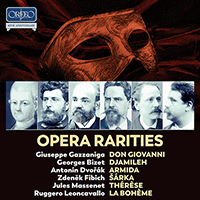Wiesław Ochman
Since the times of Jan Kiepura, Wiesław Ochman has been the first truly world-famous Polish tenor. Born in Warsaw in 1937, he first had the ambition to become a painter, before turning instead to vocal studies. In 1960 he joined the Silesian State Opera and for three seasons undertook a number of major parts there, while continuing his vocal training with Maria Szłapak. In the autumn of 1963 he moved to the opera house in Kraków, but a year later returned to his home city of Warsaw, where the Teatr Wielki was about to be reopened after rebuilding. His performance as Jontek in Moniuszko’s Halka, together with three other productions for the 1965 grand opening of the theatre, became the turning-point in his career. In the same season he also won success singing the title rôle in Faust. This resulted in an invitation to the Berlin State Opera, where he sang the part of Turiddu in Cavalleria rusticana in January 1967, followed by appearances in Munich and Hamburg. At Glyndebourne he sang Lensky in Eugene Onegin, then Tamino in Die Zauberflöte, appeared in Salzburg and, something hitherto unheard of for a Polish tenor, gained international fame as an excellent interpreter of Mozart. In particular he became a much sought-after performer for the rôle of Ottavio in Don Giovanni, and the title rôle in Idomeneo. In 1972 he appeared at the Paris Opéra, and in the United States, making his début at the Metropolitan Opera in New York in 1975 as Arrigo in Verdi’s I vespri siciliani, and going on later to appear there in Eugene Onegin, Boris Godunov and Khovanshchina. Meanwhile in 1982 he had made his début at La Scala, Milan, under Claudio Abbado. The recipient of various official awards in Poland, Wiesław Ochman has an extensive repertoire both in opera and in oratorio. He has the largest number of recordings to his credit among all the Polish singers, both from the present and from earlier generations.


















